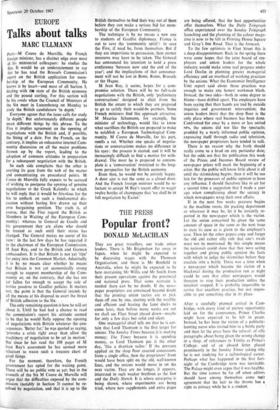Popular front?
THE PRESS DONALD McLACHLAN
They are great travellers, our trade union leaders. There is Mr Briginshaw far away in Japan, when he might be expected to be discussing wages with the Thomson Organisation; and there is Mr Bonfield in Australia, when he might be expected to be here restraining Mr Willis and Mr Smith from their present operations against the provincial and national press. That some restraint is needed there can be no doubt. If the news- paper proprietors are convinced beyond doubt that the printing union tactics are to pick them off one by one, starting with the wealthy and efficient and leaving the lame ducks to come later, then before many weeks are out we shall see Fleet Street closed down—maybe for only a few days but solid and silent.
One managerial chief tells me that he is cer- tain that Lord Thomson is the first target for unions. The Sunday Times because it is making money; The Times because it is spending money, as Lord Thomson put it the other day, 'like a drunken sailor.' If the pressure applied on the shop floor exacted concessions from a single office, then the proprietors' front would have been split on the old, well-known lines, and the unions would move in on the next victim. They are no longer, it appears, interested in such weaker brethren as the Sun and the Daily Sketch. It is where enterprise is being shown, where experiments are being tried, where new supplements and extra pages are being offered, that the best opportunities offer themselves. What the Daily Telegraph office experienced over the Sunday Telegraph launching and the planning of the colour maga- zine is now to be felt in Printing House Square and Gray's Inn Road. That is the forecast.
To the few optimists in Fleet Street this is a deep disappointment. Back in the spring there were some hopes that the joint board of em- ployers and union leaders for the whole industry would make some real progress under Lord Devlin in planning greater managerial efficiency and an overhaul of working practices by the unions. What the Economist Intelligence Unit report said about those practices was enough to make any honest workman blush. Instead, the two sides—both in some degree to blame—have drifted apart. The employers have been saying that their hands are tied by outside inquiries and government intervention; the union leaders insist that the shop floor is the only place where real business has been done. Confronted "for once by a more or less united NPA, the unions did not like the spectacle; prodded by a newly informed public opinion, expressing itself through radio and television, the newspaper proprietors have tended to sulk.
There is no reason why the froth should really come to a head on any particular date; but the odds are that the publication this week of the Prices and Incomes Board review of newspaper prices will mark the beginning of a crisis. But the public will know little about it all until the skirmishing begins; then it will be too late for the processes of public opinion to have any influence. I should therefore like to air for a second time a suggestion that I made a year ago when complaining about the secrecy in which newspapers wrap their own affairs.
If in the next few weeks pressure begins in the machine room, the packing department or wherever it may be, let it be instantly re- ported in the newspaper which is the victim. Let the union concerned be given the same amount of space in the same or the next issue to state its case as is given to the employer's case. Then let the other papers copy and forget the old and rather silly rule that one's rivals must not be mentioned. By this simple means the nationals could show that they were acting together and giving public opinion the facts with Which to judge the skirmishes before they escalate into a battle. There was a time when a newspaper which became the victim of a blackmail during the production run at night could be sure that other newspapers would threaten to stop their production unless the mischief stopped. It is probably impossible to revive that excellent practice, but not impos- sible to put something else in its place.
After a carefully' planned arrival in Cam- bridge, with every kind of picture opportunity laid on for the cameramen, Prince Charles might have expected to be left in peace. Instead, he has been the victim of a publicity- hunting nurse who invited him to a bottle party and then let the press have the refusal; of silly paragraphs about being given the wrong change in a shop; of references to Trinity as Prince's College; and of an absurd letter placed prominently in the Sunday Times asking why he is not studying for a technological career. Perhaps what has happened in the first fort- night of the Cambridge term was inevitable. The Palace might even argue that it was healthy. But the time Cannot be far off when editors should have among themselves some tacit agreement• that the heir to the throne has a right to privacy while he is a student.


































 Previous page
Previous page